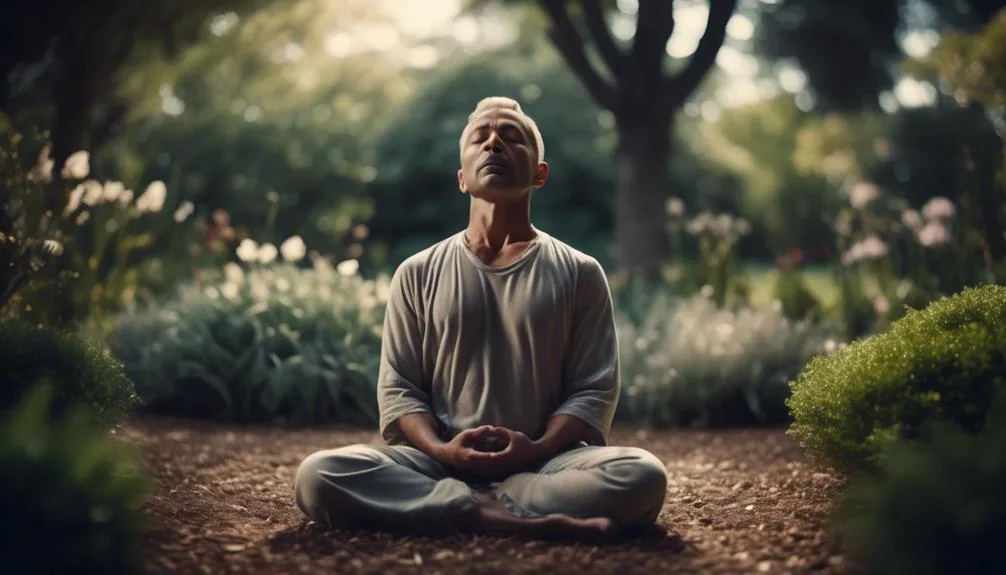Imagine you're walking through a bustling city, surrounded by the cacophony of traffic, people, and the hum of city life. But instead of feeling overwhelmed, you're calm, grounded, and deeply connected to every sensation in your body.
This is the power of being present in your body, a skill that can transform your relationship with stress, anxiety, and the world around you. But how do you cultivate such a skill?
Let's explore the techniques and strategies that can help you find a secure connection with your physical self, paving the way for a more balanced, mindful life.
Key Takeaways
- Body and mind are interconnected, emphasizing the importance of body awareness in being present.
- Breathing techniques can serve as anchors for presence, promoting relaxation and focus.
- Mindful exercises, such as yoga, can enhance the mind-body connection and promote clarity and flexibility.
- Healthy habits, including proper nutrition, regular exercise, sufficient sleep, and emotional nourishment, support a harmonious relationship with the body and promote presence.
Understanding Body Awareness

Becoming aware of your body isn't just about recognizing when you're physically uncomfortable; it's about tuning into a deeper understanding of your physical presence and how it interacts with your surroundings. This concept, rooted in Embodiment Theory, suggests that your mind and body aren't separate entities, but rather two parts of a whole, influencing each other.
Your sensory perception also plays a critical role. It's through your senses that you experience the world. So, when you're fully present, you're not just passively observing; you're actively participating. You're feeling the sun on your skin, noticing the gentle rhythm of your breathing.
This is freedom, my friend. Freedom from distraction, from disconnection. It's a journey, but it's worth it. Keep going.
Techniques for Grounding Yourself

You're ready to explore grounding techniques, powerful tools that can anchor you firmly in the present moment, helping you to fully engage with your body and the world around you.
Breathing techniques and sensory exploration are just two methods that can create a sense of calm and connection.
Try these strategies:
- Breathing Techniques: Control your breath, it's your anchor.
- Deep Breathing: Inhale slowly, hold, then exhale slowly.
- Box Breathing: Inhale, hold, exhale, hold – all for equal counts.
- Sensory Exploration: Notice your surroundings, engage with the world.
- Touch: Feel textures around you.
- Sight: Observe colors and movements.
- Sound: Listen to the world's rhythm.
Freedom lies in the present. Ground yourself, connect, and experience life fully. You've got this.
The Role of Mindful Exercises

Mindful exercises, your personal toolkit for clarity and focus, can play a crucial role in keeping you rooted in the present moment. They're the gateway to a state of freedom, allowing you to truly inhabit your body. This involves techniques such as focused breathing and yoga practices, which promote a profound mind-body connection.
Consider this:
| Mindful Exercise | Benefit |
|---|---|
| Breathing Techniques | Calms mind, increases focus |
| Yoga Practices | Enhances flexibility, reduces stress |
Each of these exercises offers unique benefits. Breathing techniques, for example, can work wonders in quieting your mind and sharpening your focus. Yoga practices, on the other hand, can enhance your flexibility while helping you to shed stress. By integrating these mindful exercises into your daily routine, you'll be better equipped to remain present in your body.
Healthy Habits for Body Connection

Establishing wholesome habits, like proper nutrition, regular exercise, and sufficient sleep, can significantly enhance your connection with your body, grounding you in the here and now. It's about creating a harmonious relationship with your physical self that's rooted in love, respect, and understanding.
To boost this connection, consider these steps:
- Emotional Nourishment:
- Practice self-love daily
- Be mindful of your emotions and express them healthily
- Sensory Integration:
- Engage all your senses during activities
- Take time to appreciate each sensation
- Healthy Lifestyle:
- Eat balanced meals
- Maintain a regular sleep schedule
Your body is your vessel, your tool for exploring the world. By nurturing it, you're granting yourself the freedom to experience life fully, authentically, and joyfully.
It's time to embrace your body and all it does for you.
Overcoming Challenges to Presence

While embracing and nurturing your body is a powerful step towards living fully, it's equally important to recognize and overcome the hurdles that might hinder your ability to stay present in your daily life.
Emotional barriers often pull us away from being in the moment. Feelings of anxiety, stress, or self-doubt can cloud your mind, making it hard to focus. Yet, you have the strength to overcome these hurdles.
Practice distraction management; when your mind starts to wander, gently bring it back to the here and now. Remind yourself of the beauty that exists within you. Embrace your emotions, but don't let them control you.
You're on a journey to freedom, and each step you take towards presence is a victory.
Frequently Asked Questions
What Are the Potential Negative Effects of Not Being Present in Your Body?
If you're not present in your body, you'll face disconnection consequences. This detachment impacts your relationships, focus, and overall wellbeing. It's crucial to stay grounded, letting yourself truly experience life's joys and challenges.
Does Body Presence Have Any Impact on Mental Health Disorders Like Anxiety and Depression?
Yes, body presence techniques can greatly impact anxiety and depression. Mindfulness impacts your mental health positively, helping you to feel more grounded, reducing stress and enhancing your overall sense of freedom and well-being.
Are There Specific Medical Conditions That Can Hinder One's Ability to Be Present in Their Body?
Yes, certain medical conditions, like physical disabilities and neurological disorders, can indeed make it harder for you to fully inhabit your body. But remember, it's about finding your own path to presence, despite the challenges.
How Does One's Cultural Background or Societal Beliefs Influence Their Ability to Connect With Their Body?
Your cultural conditioning and societal body standards can influence how you connect with your body. They can either limit or liberate you. It's key to challenge these norms and embrace your unique physicality.
Can Being Present in Your Body Improve Relationships or Communication With Others?
Absolutely, being present improves relationships. It enhances your embodied empathy, allows deeper understanding, and sharpens sensory awareness. You're more in tune with others' emotions, promoting effective communication. It's liberating, empowering, and deeply transformative.
Conclusion
So, you've decided to stop being a head floating through life, eh? Bravo! You're on your way to becoming a fully embodied human being, not just a brain on autopilot.
Remember, it's a journey, not a race. And it's okay to stumble. Heck, it's okay to faceplant sometimes. Keep practicing mindfulness and grounding techniques, nourishing your body, and embracing challenges.
You're not just living in your body, you're learning to truly inhabit it. Go you!

